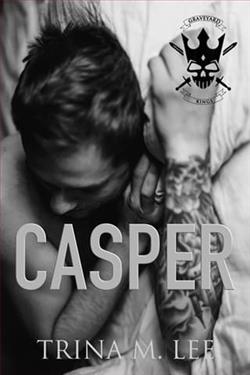Page 9 of My Obsessive Mountain Man
"Yes," I say simply. "There's all the difference in the world."
She doesn't back away, though I tower over her. That quiet courage, the unwillingness to be intimidated—it's one of the things I admire most about her.
"This was only ever meant to be a quick trip," she says, but there's a note of uncertainty in her voice that wasn't there yesterday. "Appraise the cabin, meet with the real estate agent, sign the papers, go home. That was the plan."
"Plans change."
"Not mine," she insists, but her eyes flick away, and I know she's lying—to me, to herself.
I step back, giving her space. "Come with me."
She hesitates, then follows as I lead her through the cabin to the spare bedroom—the one I've been using as a workspace when I stay over. I open the door, letting her see what I've kept hidden until now.
Inside, bathed in afternoon light, stands a writing desk. Not just any desk—one I've built with my own hands over the past year, crafted from cherry wood I milled myself, sanded to a silkenfinish. It's sized perfectly for her—the height, the drawers, the angle of the surface where she would write or draw.
"I don't understand," she says, moving into the room to run her fingers over the smooth wood.
"It's yours," I tell her simply. "I built it for you."
She turns to me, confusion clear on her face. "But... how did you know I would—"
"Your grandmother told me you always wanted a proper desk for your art. Something that wasn't just for work, but for creating." I step closer, watching her fingers trace the grain of the wood. "There's more."
I open the closest drawer, revealing a set of artist's pencils, arranged by hardness. Another drawer holds watercolor paper, cut to size. A third contains a leather-bound sketchbook, its pages blank and waiting.
"You did all this... for me?" Her voice is barely above a whisper. "Before you even met me?"
"I knew you," I say simply. "Through Martha's stories, through her letters, through the way she loved you. I knew."
Violet shakes her head slowly, backing away from the desk. "This is... a lot, Paul. You have to see that this is intense."
"I know what it looks like," I admit, making no excuses. "But ask yourself this—does it feel wrong? Does it feel threatening? Or does it feel like something you've been waiting for without knowing it?"
She opens her mouth, then closes it again. I can see the conflict in her eyes—the rational part of her that says this is toomuch, too fast, too intense, battling with something deeper that recognizes the truth.
"Your apartment in Chicago doesn't allow dogs," I say quietly. "But you've always wanted one. A big one, something sturdy that could hike with you. You hate the winters there—the slush, the dirty snow. You miss seeing stars at night. You work eighty-hour weeks appraising other people's treasures, but you haven't picked up a paintbrush for yourself in years."
Her eyes widen. "How could you possibly—"
"Martha kept every letter, Violet. Every phone call, she made notes afterward—what you said, what you didn't say. She worried about you. Said you were burying yourself alive in that city."
"That's... that's private," she says, but there's no real anger in her voice. Just shock, and something else—relief, maybe, at being seen so completely.
"It is," I agree. "And I would apologize for knowing these things, except I can't be sorry for understanding you. For seeing what you need."
"And what do I need, Paul?" she challenges, taking a step toward me. "Since you seem to have it all figured out."
I meet her gaze steadily. "You need this mountain. This air. This space to breathe and create and be exactly who you are." I pause, my heart hammering against my ribs. "And you need someone who sees you—all of you—and stays anyway."
Her breath catches. "That's... that's crazy. You're—"
"Obsessed?" I supply the word she's too polite to say. "Maybe. Or maybe I just recognize what belongs to me when I see it."
Her eyes flash. "I don't belong to anyone."
"Not yet," I agree, and watch the color rise in her cheeks. "But you belong here, Violet. In this cabin. On this mountain." I step closer, until I can feel the heat radiating from her body. "And you know it. That's what scares you—not me. The fact that this feels right when it shouldn't."
"You don't know what I feel," she says, but her voice has lost its conviction.















